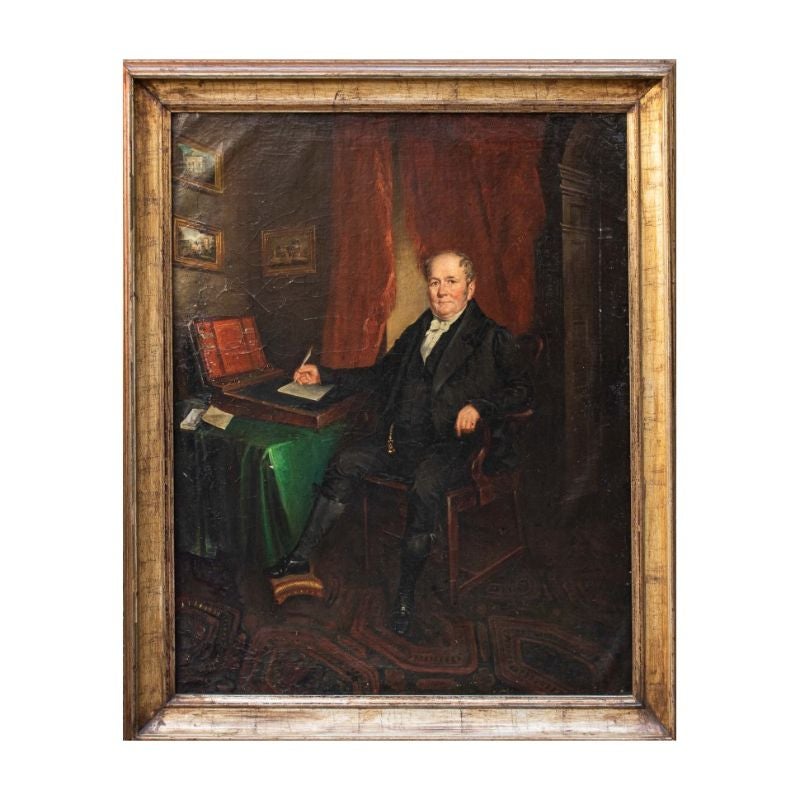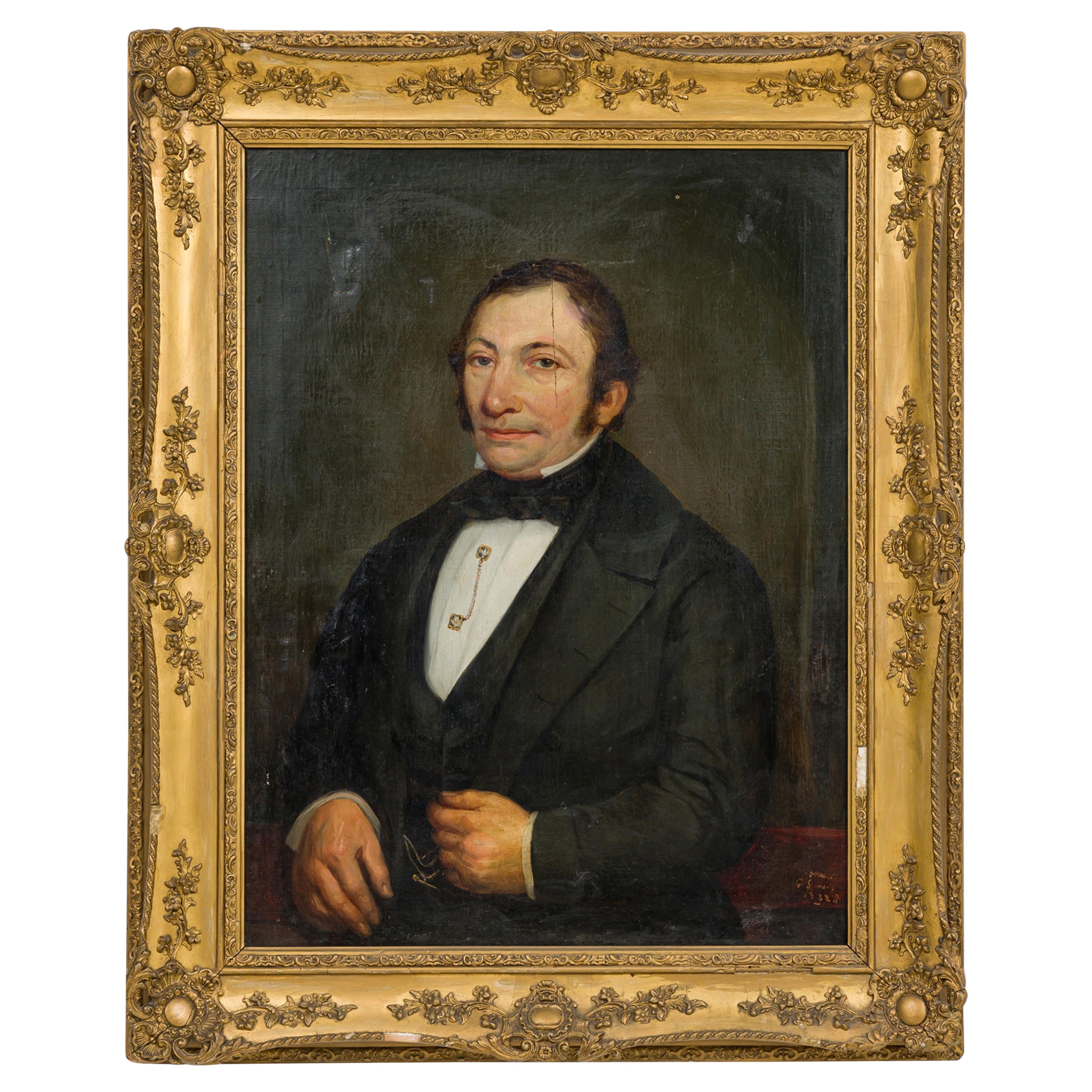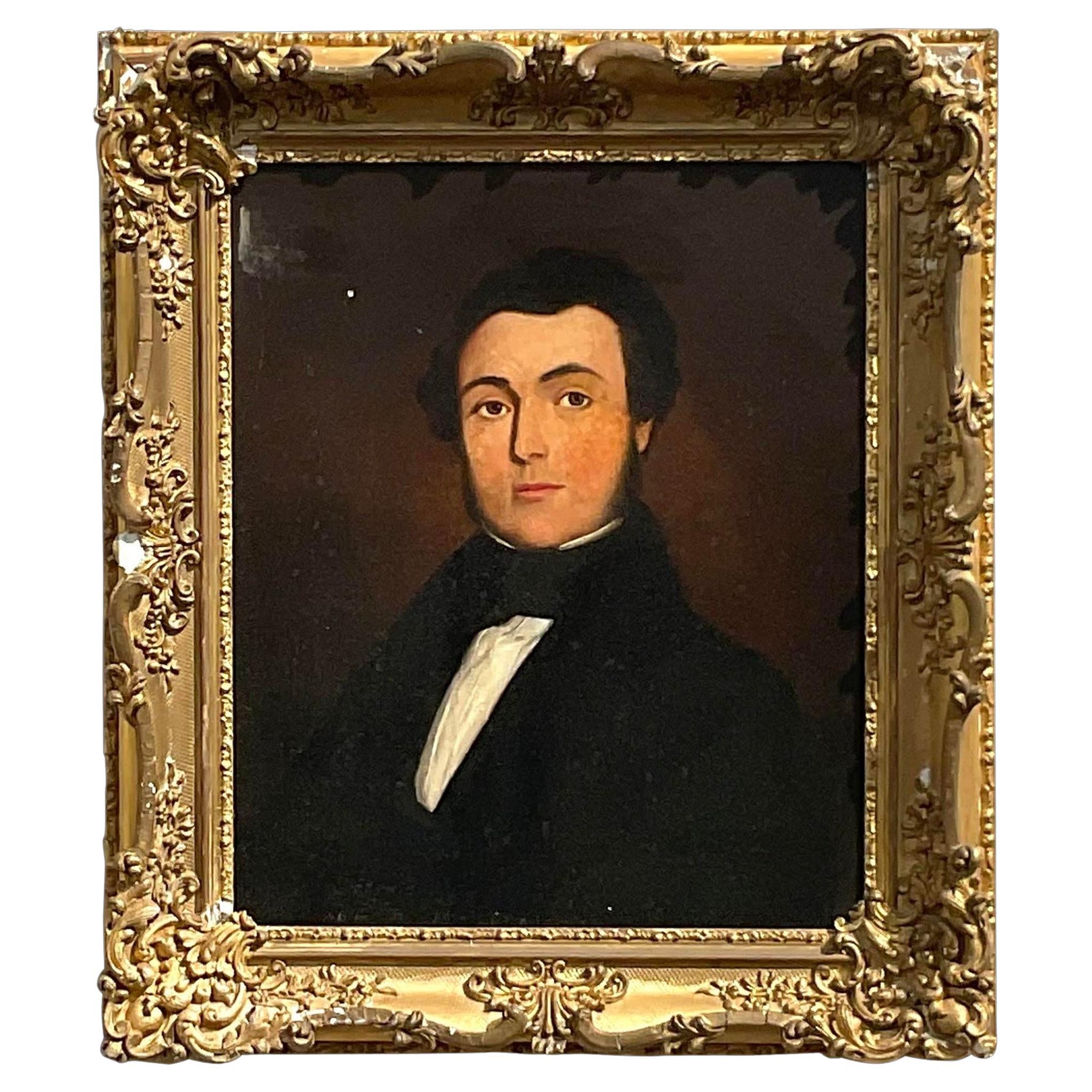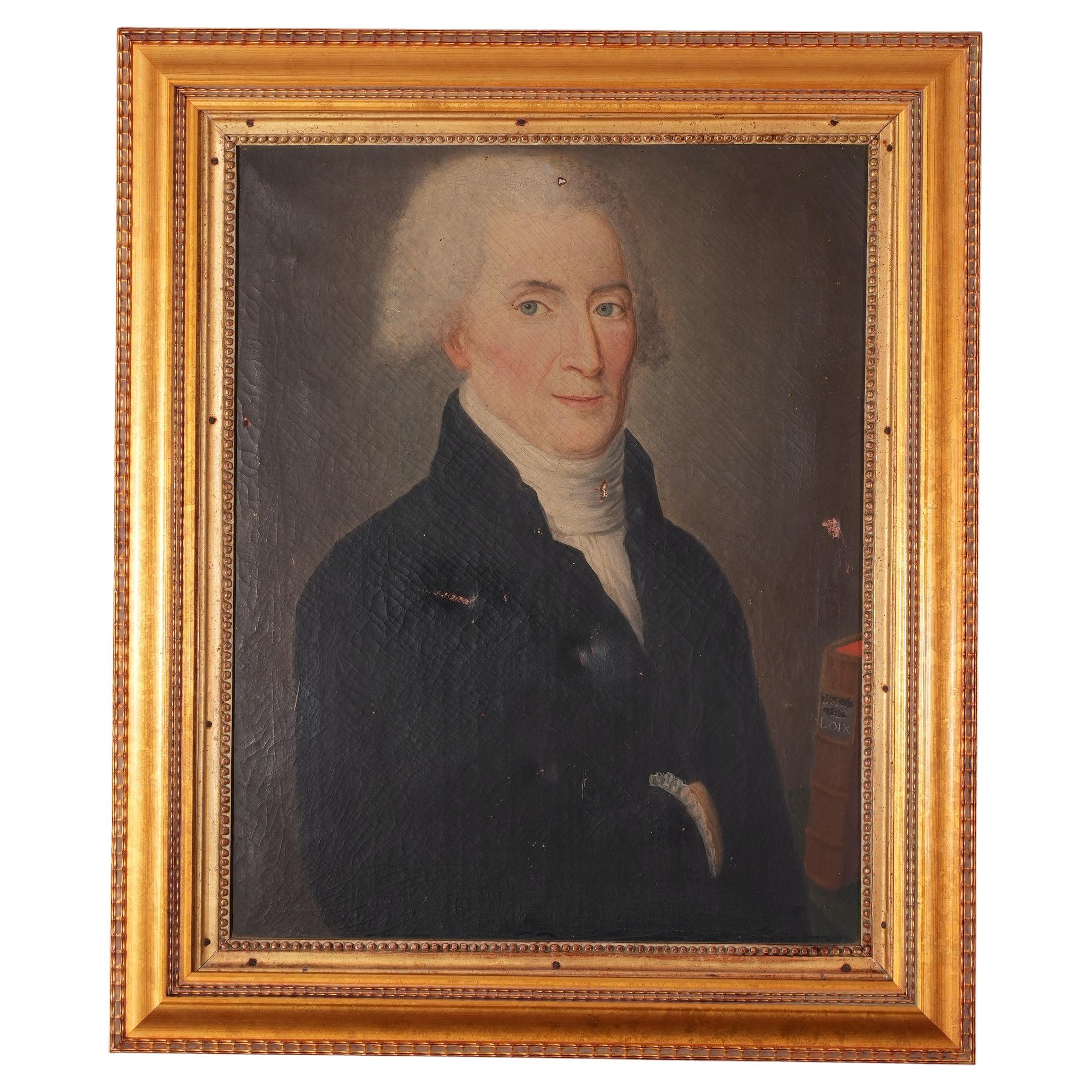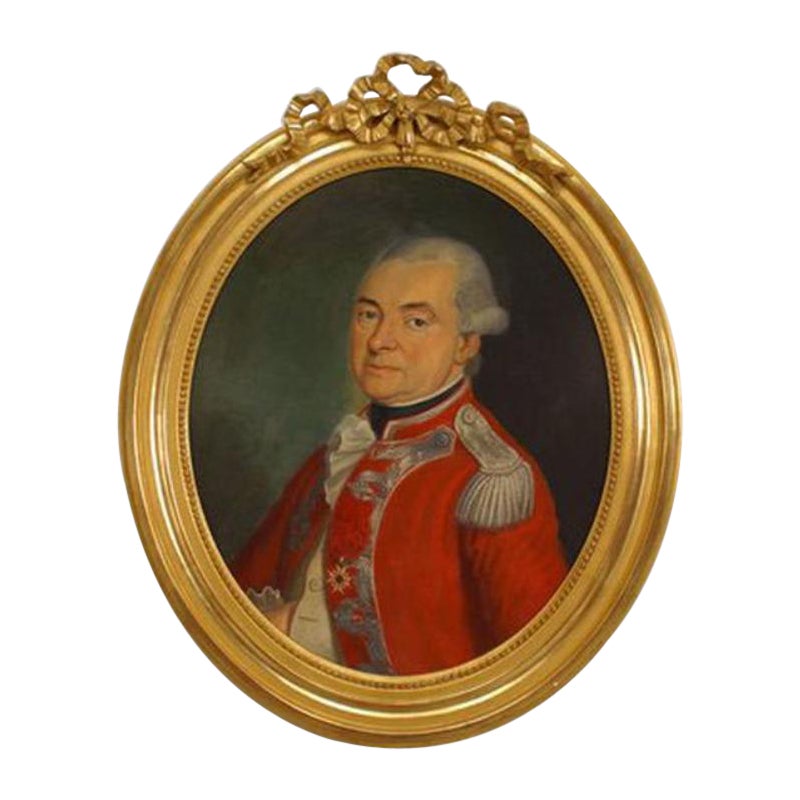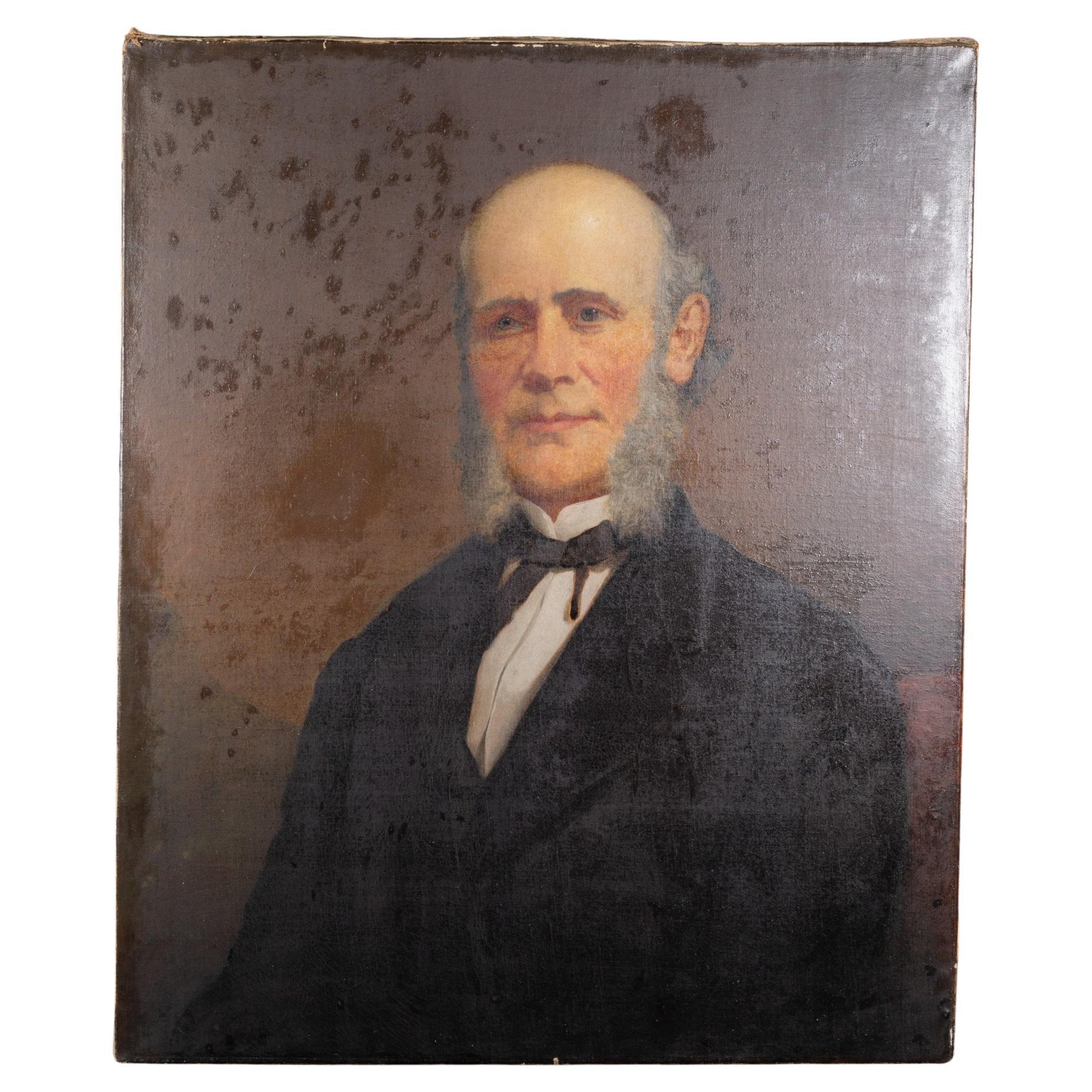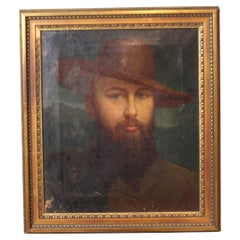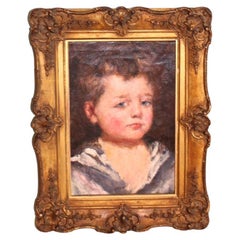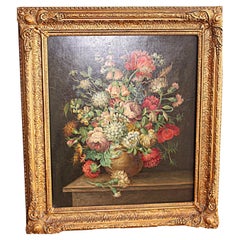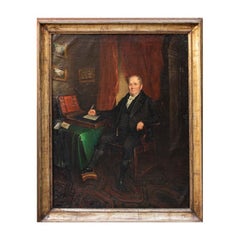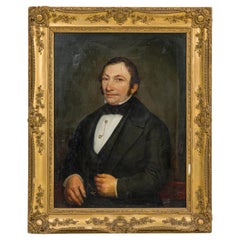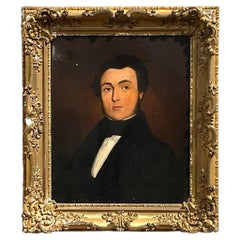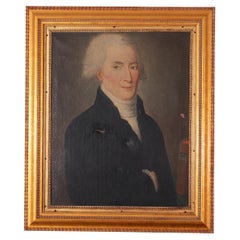Items Similar to Antique Large Portrait Of French Bordeaux Gentleman
Want more images or videos?
Request additional images or videos from the seller
1 of 10
Antique Large Portrait Of French Bordeaux Gentleman
$3,137.33
£2,330
€2,747.57
CA$4,346.35
A$4,874.72
CHF 2,552.81
MX$59,232.58
NOK 32,416.47
SEK 30,733.09
DKK 20,509.20
About the Item
Antique French Gentleman Portrait – 19th/20th Century Oil Painting – Fine Art for Collectors
This is a stunning antique portrait of a distinguished French gentleman, an exquisite 3/4-length oil painting that exudes character and refinement. The elderly French man is depicted seated in an elegant French Carolean high-back throne chair, holding a French antique gold box, symbolising wealth, power, and prestige. His confident expression and direct gaze engage the viewer, making this a captivating and historically significant artwork.
Historical & Artistic Significance: French Gentleman Portrait Oil Painting
French Gentleman Portrait Oil Painting painted between the late 19th and early 20th centuries, this exceptional fine art portrait is believed to have originated in Bordeaux, France, adding to its authenticity and value. The artwork was supplied by the renowned A La Palette d'Or / Bonnet, a historical purveyor of painting and drawing materials, located at 52 Fossés de Maintenance, Bordeaux.
In the 19th century, portraiture was a powerful way to showcase wealth and social status. French dignitaries and aristocrats commissioned detailed oil paintings to immortalize their legacy. This painting follows the tradition of grand portraiture, reminiscent of works by Jean-Auguste-Dominique Ingres, Jacques-Louis David, and Édouard Manet. The subject is presented with a noble posture, dressed in luxurious, tailored attire, reinforcing his status, intellect, and sophistication. The rich background and elegant composition make this piece an outstanding addition to any art collection, gallery, or period home.
Key Features:
Antique French Oil Painting – Late 19th / Early 20th Century
3/4 Length French Gentleman Portrait Oil Painting
French Carolean High-Back Chair & Gold Box
Artistically Detailed Face & Confident Expression
Original Provenance: A La Palette d’Or, Bordeaux
Rich Historical & Decorative Appeal
Perfect for Collectors, Interior Designers & Antique Enthusiasts
Measurements (Excluding Frame):
Height: 101 cm
Width: 81 cm
Condition Report:
This antique oil portrait is in overall good condition but does show signs of age, including craquelure throughout the surface, a previous minor repair, and some paint loss on the right side. These elements contribute to its authentic antique charm. Please review all provided photos, as they form part of the item’s description.
Antique Portrait of a French Gentleman is Perfect For:
Antique Art Collectors & Fine Art Enthusiasts
Period Homes & Historic Interiors
Luxury Home Decor & Interior Design
French & European Art Collectors
Antique Dealers & Galleries
Gift for Art Lovers & Historians
- Dimensions:Height: 39.77 in (101 cm)Width: 31.89 in (81 cm)Depth: 1.58 in (4 cm)
- Style:French Provincial (Of the Period)
- Materials and Techniques:
- Place of Origin:
- Period:
- Date of Manufacture:1890s
- Condition:Wear consistent with age and use. Minor losses. Minor fading.
- Seller Location:Seaford, GB
- Reference Number:1stDibs: LU10376245016982
About the Seller
New to 1stDibs
Joined in the past six months.
No Reviews Yet
Vetted Professional Seller
Every seller passes strict standards for authenticity and reliability
Established in 2021
1stDibs seller since 2025
Typical response time: 3 hours
- ShippingRetrieving quote...Shipping from: Seaford, United Kingdom
- Return Policy
Authenticity Guarantee
In the unlikely event there’s an issue with an item’s authenticity, contact us within 1 year for a full refund. DetailsMoney-Back Guarantee
If your item is not as described, is damaged in transit, or does not arrive, contact us within 7 days for a full refund. Details24-Hour Cancellation
You have a 24-hour grace period in which to reconsider your purchase, with no questions asked.Vetted Professional Sellers
Our world-class sellers must adhere to strict standards for service and quality, maintaining the integrity of our listings.Price-Match Guarantee
If you find that a seller listed the same item for a lower price elsewhere, we’ll match it.Trusted Global Delivery
Our best-in-class carrier network provides specialized shipping options worldwide, including custom delivery.More From This Seller
View All19th century English school Portrait of Railway Engineer
Located in Seaford, GB
19th-Century Portrait of William Morton, Civil Engineer
Inscribed top left William Morton at 50 1882
Step into history with this exceptional 19th-century portrait of William Morton,...
Category
Antique 19th Century English Victorian Paintings
Materials
Canvas
Portrait of a Young British Gentleman in China Chinese Export School, circa 1920
Located in Seaford, GB
An evocative early 20th-century oil portrait depicting a poised young British gentleman, likely a merchant or naval officer, painted against a moody, clouded sky with a distinct pago...
Category
Early 20th Century Chinese Export Paintings
Materials
Paint
Antique Portrait of Young boy Robert Henri
By Robert Henri 1
Located in Seaford, GB
Antique Oil Painting – Studio of Robert Henri – Sailor Boy Mick – Early 20th Century Artwork
Experience the timeless beauty of this Robert Henri Cozad Sailor Boy Mick Oil Painting o...
Category
Vintage 1920s Irish Art Deco Paintings
Materials
Paint
$1,561 Sale Price
20% Off
Exquisite 19th Century English Still Life of wild flowers– Oil on Wood Panel
Located in Seaford, GB
A captivating and finely executed 19th-century English still life painting, rendered in oil on wood panel, depicting an abundant bouquet of mixed flowers in a terracotta urn. This hi...
Category
Antique 19th Century English High Victorian Paintings
Materials
Paint
Early 19th century Capriccio Brazil School Painting
Located in Seaford, GB
Rare Early 19th century Capriccio view of Rio de Janeiro Painting
Probably painted circa 1810 by one of Jean-Baptiste Debret, Italian Students.
Painted on Sailcloth.
Historical Context of Early 19th Century Portuguese Colonial Brazil
1.1 Transition from Colony to Empire
During the early 19th century, Brazil underwent a seismic shift in its political status. Originally a colony under the Portuguese Empire, the arrival of the Portuguese Royal Court in Rio de Janeiro in 1808 rapidly elevated the city’s cultural and political importance. By 1815, Brazil was declared a kingdom united with Portugal, setting the stage for the emergence of the Empire of Brazil in 1822. This period of transformation—often termed the transitional period from colony to empire—fueled a wave of artistic production in cities like Rio de Janeiro.
1.2 European Artistic Influence in Brazil
With the French Artistic Mission in Rio (initiated in 1816) and the presence of various Portuguese and European artists, Brazilian art of the early 1800s began to reflect diverse influences, from neoclassical painting to the early rumblings of romanticism. Painters such as Jean-Baptiste Debret, and Nicolas-Antoine Taunay, and local luminaries like Manuel de Araújo Porto-Alegre contributed to the fine arts tradition in Brazil. Their works featured scenes of local life, portraits of Brazilian society, and imaginative vistas—sometimes referred to as “capriccios,” in which real elements were combined with artistic liberties to create an idealized panorama.
1.3 Rio de Janeiro as Cultural and Political Hub
Rio de Janeiro, often called the Imperial capital after Brazil’s independence, was home to foundational institutions like the Imperial Academy of Fine Arts (Academia Imperial de Belas Artes). Later evolving into the Escola de Belas Artes (School of Fine Arts in Rio), these academies nurtured the talents of emerging painters, who found patronage under the Royal Court and, subsequently, the Imperial Court. The city’s significance was further enhanced by the construction of significant buildings, the modernization of infrastructure, and the mingling of European courtly customs with the traditions of local inhabitants.
. Description of the Octagonal Oil on Canvas: A Capriccio View of Rio de Janeiro
2.1 Composition and Layout
The most striking characteristic of this 19th-century Brazilian art piece is its octagonal shape, a relatively unusual format that draws the viewer’s gaze toward its centre. The composition showcases Rio de Janeiro’s shoreline in the early 1800s, brimming with merchant ships and smaller boats anchored near the shore. On the sand, there is a bustling crowd of local people—men and women carrying food and goods on their heads, loading and unloading boats, and engaging in everyday commerce. The backdrop of soaring mountains suggests Rio’s iconic topography, embodying the landscape that famously defines the city.
2.2 Architectural and Religious Landmarks
On the left side, one can discern the silhouette of a church believed to be Santa Lucia, a significant religious structure in the heart of early 19th-century Rio. This element provides viewers with a tangible reference point, linking the scene to an actual location. However, because this painting is labelled as a “capriccio,” the artist might have taken creative liberties by rearranging or amplifying certain features of the city. The melding of real and idealized elements is characteristic of these imaginative vistas.
2.3 Evoking Daily Life in Colonial Rio
One of the painting’s greatest appeals lies in its portrayal of daily life during the colonial era. Men and women from various backgrounds populate the scene. Some appear to be carrying goods on their heads, a common practice in Brazil that has persisted through different centuries. Others appear to be haggling or trading near small vessels, revealing the commercial pulse of an active port city. This focus on local people, combined with the grandeur of merchant ships, captures the tension and synergy between the every day and the extraordinary—a hallmark of Brazilian colonial painting that balances the grand narratives of empire with the rhythms of ordinary life.
2.4 An Amalgamation of Neoclassical and Romantic Influences
Although academic art in early 19th century Brazil was highly influenced by neoclassicism, the onset of romanticism can be spotted in the emotional portrayal of the sky, the lively palette, and the dramatic emphasis on nature’s beauty (the mountains, in particular). This duality reflects the fine arts tradition in Brazil during the transitional phase when artists were embracing multiple styles. As part of the School of Rio or the Rio de Janeiro school, painters often integrated academic techniques learned from European masters with emerging local subjects and influences.
3. Institutions and Artistic Movements
3.1 Imperial Academy of Fine Arts
Originally known as the Royal School of Sciences, Arts, and Crafts, the Imperial Academy of Fine Arts in Rio de Janeiro was instrumental in shaping 19th-century Brazilian art. Influential artists and teachers from Portugal, France, and other European nations congregated at the Academy, imparting their expertise to native students. As the monarchy consolidated power, the Academy enjoyed royal patronage, leading to the creation of Imperial Academy-style works that combined European academic rigour with Brazilian-themed subject matter.
3.2 Impact of the French Artistic Mission
The French Artistic Mission, which arrived in 1816, played a pivotal role in introducing advanced European artistic techniques, thereby elevating the overall quality of painting in Brazil. Artists like Jean-Baptiste Debret not only documented Brazilian society but also spearheaded the development of a local visual identity that aligned with both academicism and the national context of a blossoming empire. Debret, alongside others such as Nicolas-Antoine Taunay, mentored Brazilian artists, sowing the seeds of what would become the Brazilian academic art movement.
3.3 Religious, Historical, and Landscape Paintings
In addition to everyday scenes and historical compositions, religious iconography remained crucial throughout Portuguese colonial and imperial Brazil. Churches were omnipresent in cityscapes like Rio de Janeiro. Many colonial-era Brazilian portraits...
Category
Antique Early 19th Century Brazilian Spanish Colonial Paintings
Materials
Canvas
$2,908 Sale Price
20% Off
19th-century Scotland Edinburgh Horse Fair Painting
By Rosa Bonheur
Located in Seaford, GB
A rare 19th-century painting of the Horsefair at the Grassmarket, Edinburgh, Scotland
Follower of Rosa Bonheur, oil on canvas
indistinctive collector wax seals verso.
19th-Century...
Category
Antique 1860s British High Victorian Paintings
Materials
Canvas
$8,078 Sale Price
20% Off
You May Also Like
19th Century Portrait of a Gentleman Painting Oil on Canvas Lombard School
Located in Milan, IT
19th century, Lombard school
Portrait of a Gentleman
Oil on canvas, 92 x 71 cm
With frame 107 x 87 cm
The elegant portrait in question depicts a carefully dressed gentle...
Category
Antique 19th Century Italian Paintings
Materials
Canvas
American Victorian Man Portrait
Located in Queens, NY
American Victorian gilt framed oil painting portrait of 19th Century man with stick pin and white shirt
Category
Antique 19th Century American Victorian Paintings
Materials
Paint
Vintage Regency 19th Century Portrait of a Gentleman
Located in West Palm Beach, FL
The Vintage Regency 19th Century Portrait of a Gentleman is an exquisite piece of art that captures the elegance and refinement of the Regency era. This finely detailed portrait feat...
Category
Antique 19th Century British Regency Paintings
Materials
Canvas, Wood, Paint
French Oil On Canvas Portrait of a Man c. 1800
Located in 263-0031, JP
French oil on canvas portrait of a man c. 1800. The bourgeois gent depicted here displays the cliched hand-in-waistcoat mannerism of the 18th and early 19th century. He’s wearing wha...
Category
Antique Early 19th Century French Paintings
Materials
Canvas
Frenchman Portrait
Located in Queens, NY
Copy of a portrait of a Frenchman in uniform in a gold oval frame- (Companion to TR2006)
Category
Late 20th Century French Victorian Paintings
Materials
Paint
$4,900
American 19th c. Oil Portrait of a Gentleman, c.1800s
Located in San Francisco, CA
ABOUT
A 19th century oil portrait on canvas of a gentleman. Unsigned.
CREATOR Unknown.
DATE OF MANUFACTURE c.1800s.
MATERIALS AND TECHNIQUES Oil on Canvas. Unframed.
...
Category
Antique 19th Century Victorian Paintings
Materials
Wood, Paint
$1,195 Sale Price
20% Off
More Ways To Browse
Antique Plow
Antique Salt Bowls
Antique Shamrock
Antique Spring Scale
Antique Street Clock
Antique Thai Buddha Statue
Antique Trough Fountains
Antique Water Kettle
Antique Wood Santos Santo
Art Nouveau Room Divider
Art Nouveau Sugar Bowl
Barbara Barry For Baker
Beetle Model
Blue Swedish Chest
Bone Inlay Dresser
Brass Couple Sculpture
Bruksbo Rosewood
Car Wall Sculpture
